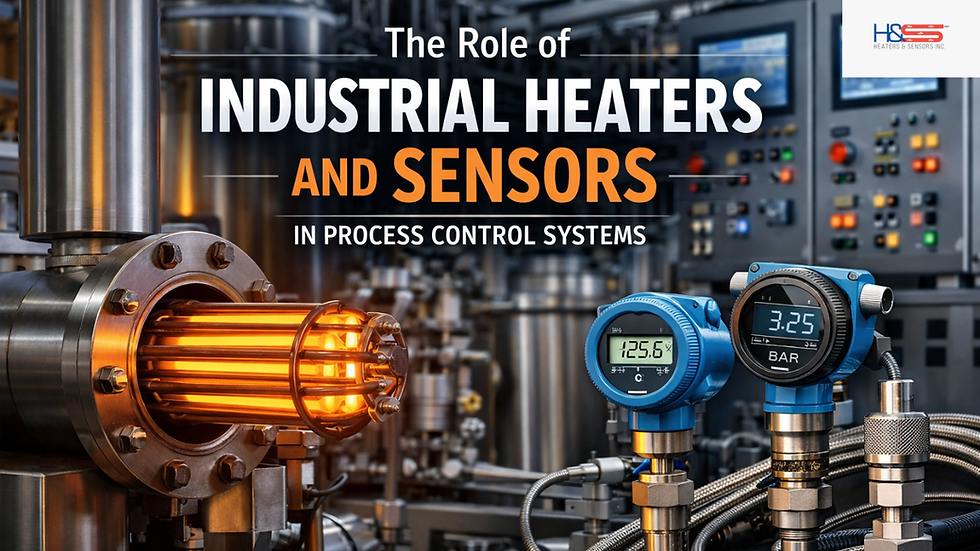The Benefits of Open Coil Heaters: Easy to Install and Operate!
- heaterssensors
- Aug 14, 2024
- 3 min read

Introduction
These coil heaters are a popular choice for both residential and commercial heating needs. They are valued for their efficiency and simplicity. However, like any heating device, they require proper installation and maintenance to function optimally and safely. This article will provide you with comprehensive tips on how to install and maintain your open coil heater to ensure it performs well and lasts long.
1. Understanding Open Coil Heaters
What is this Coil Heater?
An open coil heater uses a heating element with exposed coils to generate heat. These coils, typically made from materials like nichrome, heat up when electrical current passes through them. The heat is then radiated into the surrounding area.
How Does it Work?
When powered, electricity flows through the coil, causing it to heat up. The generated heat is then radiated into the surrounding air, efficiently warming the room.
Advantages and Disadvantages
The main advantages of these heaters include their simplicity, cost-effectiveness, and the ability to heat up quickly. However, they can be less efficient than some modern heating systems and may require regular maintenance to ensure optimal performance.
2. Installation Tips for Open Coil Heaters
Choosing the Right Location
Select a location that allows the heater to distribute warmth evenly throughout the room. Avoid placing it near flammable materials or in areas with high humidity, which could affect its performance and safety.
Preparing the Electrical System
Before installation, ensure that your electrical system can handle the power requirements of the heater. It's advisable to have a qualified electrician inspect your system to prevent any issues related to power supply.
Installing the Heater Safely
Wiring and Connections
Follow the manufacturer’s instructions for wiring the heater. Ensure all connections are secure and that the heater is properly grounded. Incorrect wiring can lead to electrical hazards.
Mounting the Heater
Mount the heater according to the manufacturer’s guidelines. It should be securely fastened to avoid any movement or vibration that could lead to damage.
Testing the Heater Post-Installation
Once installed, test the heater to ensure it operates correctly. Check that it heats up as expected and that all controls function properly.
3. Maintenance Tips for Open Coil Heaters
Regular Cleaning and Inspection
Cleaning the Coils
Dust and debris can accumulate on the heating coils, reducing efficiency and potentially causing overheating. Regularly clean the coils with a soft brush or a vacuum cleaner to remove any buildup.
Checking for Dust and Debris
Inspect the heater for any dust or debris that might obstruct airflow. Keeping the heater clean will improve its performance and extend its lifespan.
Monitoring Heater Performance
Temperature Control
Ensure the heater maintains the desired temperature. If you notice significant fluctuations, it may indicate a problem with the thermostat or heating element.
Heat Output
Monitor the heat output to ensure it is consistent with the heater's specifications. Inconsistent heat output could signal a malfunction.
4. Safety Precautions
Electrical Safety
Prioritize safety when handling electrical components. Ensure all connections are secure and avoid overloading circuits to prevent hazards.
Preventing Overheating
To prevent overheating, make sure the heater is not covered or obstructed. Overheating can lead to safety hazards and reduce the heater’s lifespan.
Safe Usage Practices
Follow the manufacturer’s guidelines for safe operation. Avoid placing the heater near flammable materials and ensure it is installed in a well-ventilated area.
Conclusion
Proper installation and maintenance of your open coil heater are essential for ensuring its efficiency and longevity. By following these tips, you can keep your heater in top condition and enjoy consistent, reliable heat. Regular maintenance not only helps in avoiding unexpected breakdowns but also contributes to a safer and more comfortable environment.





Comments